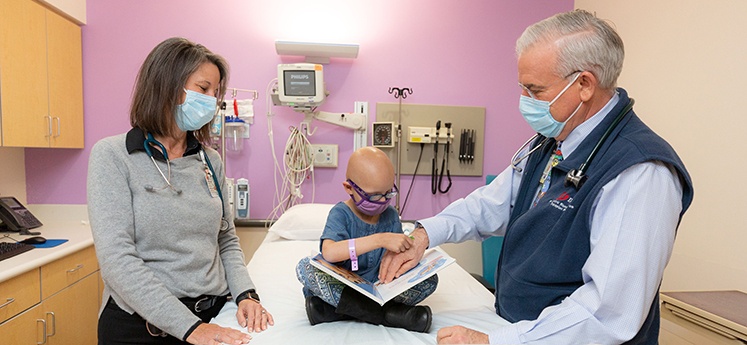
For the past three decades, the Duke Division of Pediatric Transplant and Cellular Therapy (PTCT) has provided life-saving transplants to more than 2,500 patients, including 70 percent receiving transplants from family, cord blood or unrelated donors and 30 percent receiving autologous cells. Over 1,000 transplants have been performed for patients with leukemia or lymphoma and approximately 200 for neuroblastoma. Collectively our faculty is world-renowned in the transplantation of children with inherited metabolic diseases (including lysosomal storage and peroxisomal disorders), performing nearly 350 transplants. In partnership with our Duke pediatric immunology colleagues, we have transplanted more than 200 patients with inherited immunodeficiency disease. In addition, we have transplanted more than 200 patients with sickle cell disease, thalassemia and other non-malignant bone marrow disorders and are distinguished for our experience in treating Krabbe disease, metachromatic leukodystrophy, adrenoleukodystrophy, Hurler syndrome, Hunter syndrome, Batten disease and numerous other rare genetic diseases.
Over the years, our expertise has evolved from a program providing pioneering cord blood transplants to one utilizing any type of donor and transplantation regimen to achieve the best outcomes for our patients. We are well established in all areas of autologous and allogeneic hematopoietic cell transplantation and CAR-T therapies. We also have established programs in gene therapy and a wide range of cell therapies for transplant patients as well as in the emerging field of regenerative medicine.
The PTCT Division also offers a comprehensive Multi-Disciplinary Clinic focused on Survivorship. A dedicated team of PTCT, Pulmonary, Gynecology/Fertility, Endocrine, Infectious Disease, Physical Therapy, Nutrition, Pharmacy, Social Work, Nurse Clinicians and other experts work collaboratively to evaluate all patients who have received transplant, cell and gene therapies into survivorship. We holistically address medical screening, re-vaccination and psychosocial and nutrition concerns among all of our survivors and continue to screen for newly available treatments and research opportunities from which our patients may benefit.
Specifically, the division has extensive expertise and experience in performing:
Hematopoietic Cell Transplantation
- Haplo-identical donor transplant using post-transplant cyclophosphamide as well as magnetic T cell depletion protocols
- Related and unrelated bone marrow transplantation
- Peripheral blood stem cell transplantation
- Umbilical cord blood transplantation
- Non-myeloablative, reduced intensity and reduced toxicity transplantation
CAR-T Therapy for Hematologic Malignancies
Gene Therapy
- Sickle Cell Disease
- Severe Combined Immunodeficiency Diseases (SCID)
- Thalasemmia
- Chronic granulomatous disease
Cell Therapies
- DUOC-01 for inherited metabolic diseases and multiple sclerosis
- Cord blood infusions for children with brain injuries (cerebral palsy (CP), autism, hypoxic-ischemic encephalopathy (HIE), acute ischemic stroke)
- Cord tissue derived mesenchymal stromal cell (MSC) infusions for graft versus host disease (GvHD), autism, hypoxic-ischemic encephalopathy (HIE), COVID-ARDS, COVID-MISC
- Bone marrow derived MSCs for GvHD
- Cytotoxic lymphocytes
- Tumor infiltrating lymphocytes
Thymus Implantation in collaboration with the Division of Allergy and Immunology
- Congenital Athymia
PTCT Multi-Disciplinary and Survivorship Program
- Clinical pre and post transplantation optimization program (C-POP)

A comprehensive description of all of our pediatric blood and marrow transplant and cellular therapy clinical services, locations, and appointment information is available on Duke Children's.